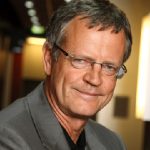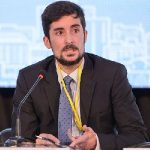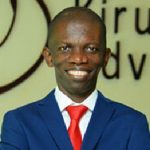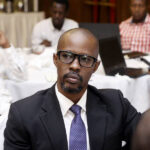Pascal Boniface launched the debate by asserting that
America is not great anymore but relies on proxies to
exert influence, a situation he attributes to Donald Trump’s
pursuit of the America first policy. “Wanting to be first is
wanting to be alone.”
Irene Ikomu argued that the way America handles its
challenges will determine if it will continue to be influential
on the global stage.
Giving the discussion a historical perspective, Robert
Kirunda said the world has been changing even before
Trump became US president. “The factors realigning the
world has very little to do with America first.” He added
that Trump does not even have intelligent policies on the
America first policy and wondered if the policy is only
about jobs and the military, or about Trump.
So, is America’s declining global hegemony
impacting the affairs of the world and the balance
of power; or is this a mere phase America is going
through?
Samuel Carcanague said the US cannot be the policeman
of the world anymore, even if it is still strong on the global
stage. “China is the businessman of the world. Russia is
the policeman of the world. America is leading in new
technology.”
Coming to the impacts on Africa specifically, Angelo
Izama pointed to the disinterest of America in Africa
under President Donald Trump, as evidenced by his
withdrawal of sanctions against Sudan’s Omar el-
Bashir’s government, and the replacement of US troops
on the continent and, particularly, in Somalia. He, however,
asserted that Trump’s isolationism has helped people
outside the US rethink key issues, such as identity politics
for Africans. “The idea that you need a policeman to
make you behave well is toxic. Trump’s policy of America
first, isolationism is dangerous for Africans.”
In their concluding remarks, the panellists echoed
the need for Africa and its leaders to be on top of
their game as emerging economic powers, such as
China, troop into the continent in what has been
termed the second scramble for Africa.
For Ikomu, the label for this phase does not matter.
What matters, however, is how Africa positions itself and
whether people will look at it as an opportunity.
Kirunda wondered what “Africa’s strategic interest” is
before stating that the continent’s problems are caused
by the continent’s leaders and, as such, solutions should
be got from within. “We shouldn’t be asking what the EU
has done for us. Foreign policy is selfish in nature.”
Izama dismissed the concept of state sovereignty and
called for countries to open their borders for true
globalisation to happen. “Sovereignty is a prison; it was
imposed on Africa.”




